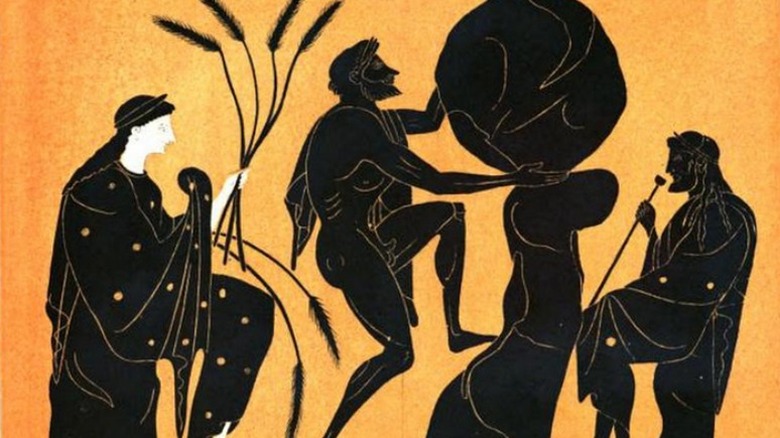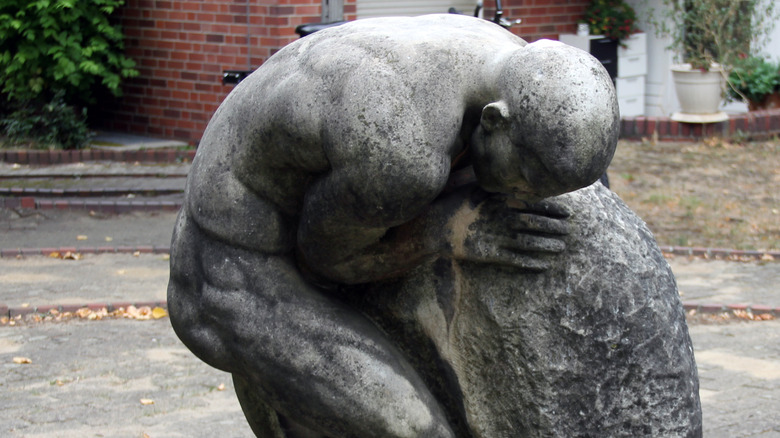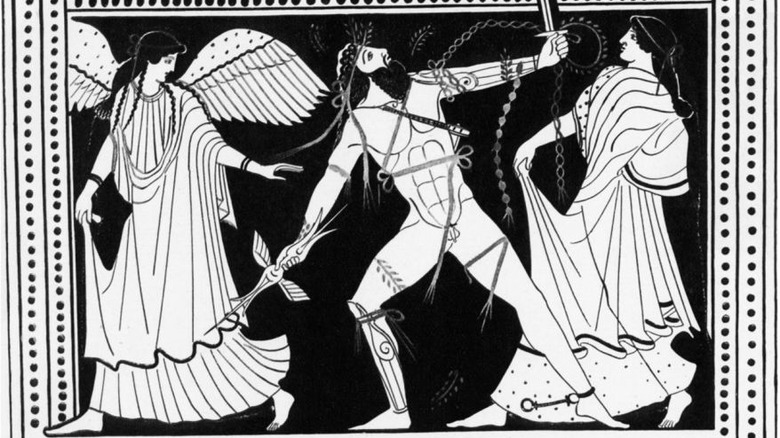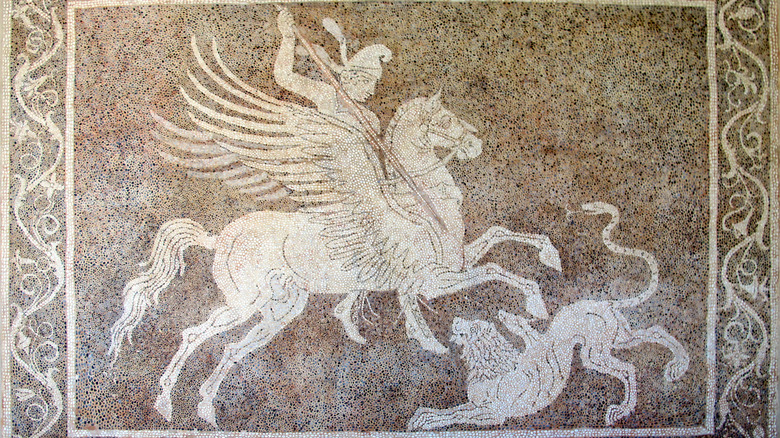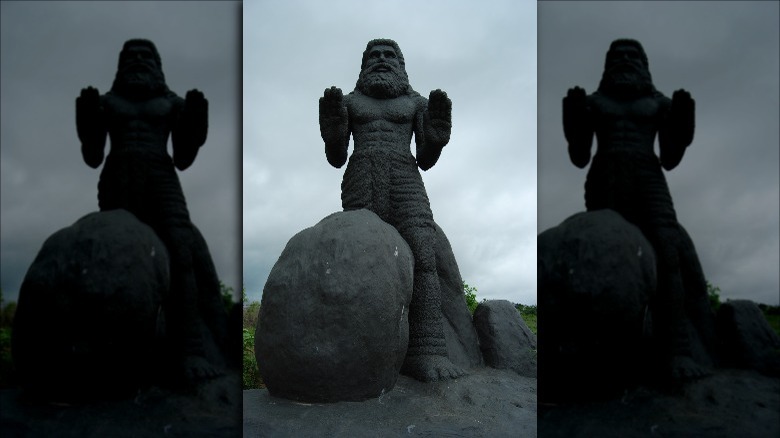The Tragedy Of Sisyphus In Greek Mythology Explained
Greek mythology has no shortage of larger-than-life heroes, including the Olympian gods like Zeus and Hera, heroic demigods like Heracles and Perseus, and terrifying monsters like Medusa and Cerberus. But among these major players are hundreds of minor characters, filling in the edges or just existing to tell us where a certain type of flower came from. One of these minor characters, however, is better known for what he does in death than anything he did in life: Sisyphus, arguably the most famous inhabitant of Tartarus, the gloomy region of the Underworld where sinners are eternally punished.
But while the image of Sisyphus rolling his boulder up the hill only for it to roll back down again is well known, other facets of his life remain obscure. Who was he? What did he do to get punished like that? And what can his story teach us about the human condition?
What it means to be 'Sisyphean'
While the complete life story of Sisyphus is generally not well known to the average person, the name should ring a bell: he's that guy that pushes that rock. The actual origin of the name Sisyphus is unknown, but the Online Etymology Dictionary records that Greek lexicographers Liddell and Scott suggested that the name might be ultimately derived from the word sophos, meaning "wise" or "clever" (also the root of philosophy), hinting at Sisyphus's mythological function as a man so crafty he could trick the gods; other linguists suggest that this is just a folk etymology.
At any rate, the name Sisyphus and the derived adjective Sisyphean don't bear any connotation of craftiness in modern times. Rather, Merriam-Webster says that a Sisyphean task is one "requiring continual and often ineffective effort," much like the famed punishment of the crafty king who rolls his rock up the hill only for it to roll all the way back down. Franz Kafka, the novelist so associated with stories of labyrinthine futility and absurdity that the term "Kafkaesque" refers to things with "a nightmarishly complex, bizarre, or illogical quality," saw some of that same energy within the story of Sisyphus, relating his own vain efforts of pursuing a domestic life and family to the frustrated king by saying "Sisyphus is a bachelor." Kafka recognized in Sisyphus the helpless feeling of perpetual and fruitless self-reliance.
Sisyphus, the wicked king of Corinth
Sisyphus came from a pretty notable family. According to the mythological work known as the "Library," falsely attributed to Apollodorus, Sisyphus was only a few generations away from Deucalion, the man sometimes called the Greek Noah, as he and his wife Pyrrha were the ones who survived when Zeus flooded the world and were responsible for repopulating humanity. Their son was named Hellen, after whom Greece was named ("Greece" in Greek is Hellas, the Greeks are Hellenes), and Hellen's sons included Aeolus, who became the king of Thessaly. (If you recognize his name from the "Odyssey," you might assume that Aeolus also became king of the winds, but that is a different guy with the same name.) Sisyphus, then, was one of four sons of Aeolus (though this varies from source to source), all of whom, despite being great kings, came to various tragic ends.
Sisyphus, however, was the cause of his own undoing. As GreekMythology.com explains, Sisyphus was the founder of a city called Ephyra, later known as Corinth, which he managed through his legendary shrewdness to build into a great commercial center and seaport. However, he was also extremely deceitful and ruthless, often killing his guests for financial gain. Such actions are violations of the Greek concept of xenia, the sacred relationship between host and guest, of which Zeus himself is directly the guardian. This would not be the last time Sisyphus angered Zeus, though.
Sisyphus's equally wicked brother
As wicked as Sisyphus was, his brother Salmoneus was just as notorious for his own impiety. As Theoi records, the mythographer Pseudo-Hyginus says that Sisyphus and Salmoneus, the king of Elis, hated each other with a great passion. Sisyphus wanted to kill his brother but knew that such an action would draw the curse of blood-guilt upon him, so he consulted the Delphic Oracle to see how he could kill Salmoneus curse-free. The oracle told him that if he had sons by Salmoneus' daughter Tyro, those sons would grow up to kill Salmoneus for him. Sisyphus followed these instructions, but once Tyro gave birth to two sons, she learned of the oracle's prophecy and murdered her own sons in order to save her father.
In the end, if Sisyphus wanted Salmoneus dead, all he had to do was wait. Driven mad by his own hubris, Salmoneus began demanding that the people of Elis worship him as Zeus. To this end, he dressed up as the thunder god and rode around town in a chariot dragging bronze kettles and outfitted with sputtering torches to imitate thunder and lightning. Calling himself equal to the king of the gods led to Salmoneus getting zapped with a thunderbolt from Olympus and sent down to the house of Hades, where he is eternally–but less famously than his brother, a kind of torture in itself–tormented.
Sisyphus rats on Zeus
While Sisyphus was notorious for his violations of xenia and for trying to murder his brother via procreation, neither of these are the crimes for which he is so famously punished in the realm of Tartarus. The thing that ultimately got Sisyphus into "most famous person in Hell"-level territory was the sin of ratting out Zeus when he was with a lady. In this particular instance out of hundreds, the lady in question was Aegina, whom Theoi describes as a nymph who was the daughter of the river god Asopus. Zeus, desiring this fair maiden, disguised himself as an eagle and absconded with her to an island that would subsequently bear her name. Asopus chased after the bird-shaped god abducting his daughter but couldn't find them. His searches eventually brought him to Corinth, where he asked King Sisyphus if he had seen anything.
Sisyphus refused to tell Asopus anything until the god granted his request of creating a freshwater spring on Corinth's acropolis. Once the god acquiesced, Sisyphus told Asopus he had seen a giant bird flying with a young maiden to a nearby island. Asopus then tracks Zeus down, but Zeus chases him back to his river with a barrage of thunderbolts. It is thus ultimately snitching for which Sisyphus is eternally punished, though his crimes aren't done yet, not by a long shot.
Sisyphus cheats Death
While Sisyphus now has multiple crimes weighing against him, he only made things worse for himself by using his legendary cunning in order to escape the punishments set out for him by the gods. As Theoi records, there was a now-lost satirical play of Aeschylus (perhaps best known for the tragic trilogy known as the "Oresteia") called "Sisyphus the Runaway" the relates in humorous fashion the manner in which the Corinthian king evaded divine judgment for as long as he could. According to this story, after Sisyphus had revealed Zeus and Aegina's location to Asopus, Zeus decided to kill the human king by sending Thanatos–the god of death himself–to escort him to the Underworld. When Thanatos arrived, Sisyphus feigned ignorance and told the god of death that he didn't understand how his chains worked and how he was supposed to be bound. Thanatos obligingly demonstrated how one should be chained up, at which point Sisyphus took Death himself as his prisoner.
Once Death was imprisoned, nothing on Earth could die. Not only did this include humans, it also meant animals killed for sacrifice or even a meal were just running around bleeding, unable to die. The gods were upset they couldn't receive sacrifices, but most upset was Ares, the god of war, whose ability to slaughter people was the only thing he had going for him. Ares released Death and sent Sisyphus to Hades.
Sisyphus cheats Death, part 2
At this point you're likely thinking, "Well, that's it for old Sisyphus. He had a good run, but now he is definitely dead and being punished like he's famous for." Well, think again. As GreekMythology.com explains, before he was dragged off to the Underworld by Thanatos, Sisyphus told his wife Merope to throw his dead body naked and uncovered into the middle of the town square. Fans of Greek mythology will know that the soul of an unburied body will not be allowed to cross the river Styx into the Underworld, and thus their ghost will be doomed to wander aimlessly on its banks. Such is what happened to Sisyphus, to the frustration of the gods.
The queen of the Underworld, Persephone, approached Sisyphus and asked him what had happened. He said that his foolish wife must have neglected to bury him properly, and that it would be a simple enough matter for him to pop back home and scold her until she had given him a funeral. Persephone, convinced by this argument for some reason, agreed to send Sisyphus back home. Naturally, instead of telling his wife to bury him and returning to the Underworld, Sisyphus stayed at home and just kept on being alive. Eventually, however, Persephone figured out that she had been tricked, and Hermes, the conductor of the dead, was sent to personally escort Sisyphus to the Underworld, for good this time.
Why a rock?
Now that Sisyphus had finally died for real, Zeus took it upon himself to make the Corinthian king's eternal torment so notable that no other human would ever try to use cunning to overturn the natural order of things. As the World History Encyclopedia explains, Sisyphus was made an example of, becoming an example of the foolishness of trying to escape fate and overturn the will of the gods, specifically in trying to "avoid humanity's sad but inescapable lot of mortality." His fate, of course, is famous. It's literally the reason you've ever heard of Sisyphus.
Homer describes the torture of Sisyphus, fruitlessly rolling a rock uphill, in the "Odyssey" like so: "Then I [Odysseus] witnessed the torture of Sisyphus, as he wrestled with a huge rock with both hands. [...] But every time, as he was about to send it toppling over the crest, its sheer weight turned it back, and once again towards the plain the pitiless rock rolled down. So once more he had to wrestle with the thing and push it up, while the sweat poured from his limbs and the dust rose high above his head." Zeus condemns Sisyphus's hubris by giving him a long, tedious, arduous task that he can't think or con his way out of, reminding Sisyphus (and thus humanity as a whole) that you can't outsmart the king of the gods.
Sisyphus's neighbors in torture
While Sisyphus might be the most famous of the cleverly-punished denizens of Tartarus, he's far from the only one. The colorful punishments of Hades are often trotted out when mythological figures such as Orpheus or Aeneas make a descent into the Underworld. The "Odyssey" describes Odysseus seeing quite a few such tortured souls when he journeys to the house of Hades to consult with the ghost of the seer Tiresias, including the Titan Tityus, who, like Prometheus, has his liver eaten by vultures every day, only for it to regrow in the night.
However, there are a couple of tortured souls in Hades whose punishments reflect futility and frustration just as Sisyphus's rolling rock does. One of these is Tantalus, who was punished both for stealing the holy food of the gods when invited to their table (a violation of xenia) and for killing and cooking his son Pelops and serving him to the gods (he got better) by being made to eternally hunger and thirst while standing in a pool of water under a fruit tree with both water and food just out of reach (the source of the English word tantalize). The other example is the 49 daughters of Danaus condemned, for the crime of murdering their husbands on their wedding night, to try to fill a tub to wash away their crimes with water carried in a leaking sieve.
The illustrious progeny of Sisyphus
Sisyphus is, of course, a well-known mythological figure due to his eternal punishment, and we've seen that he had some notable forebears. But Sisyphus also had some famous offspring as well, some of whom inherited his penchant for cleverness. As Theoi explains, Sisyphus's wife (who he of course roped into his Death-cheating schemes) was Merope, a sea nymph who was one of the seven daughters of the Titan Atlas (who holds up the sky) known as the Pleiades, who are today best known as the star cluster of that name that they were said to have turned into. Sisyphus and Merope had several sons, including Glaucus, whose main achievement was being eaten by his own horses. More importantly, however, Glaucus was the father of Bellerophon, the human hero best known for taming Pegasus and slaying the Chimera.
However, Sisyphus may have had an even more famous descendant. According to Pseudo-Hyginus, the master thief Autolycus had been stealing cattle from Sisyphus, and when Sisyphus figured it out, he repaid the thief by seducing his daughter Anticlea, the mother of Odysseus. While officially Odysseus's father was the king Laertes, many believe that the cleverest hero of the Greek forces of Troy, Odysseus, was the progeny of two of the craftiest men who ever lived, Autolycus the king of thieves and Sisyphus, the man who cheated Death twice.
What does it all mean?
So ... great. We've gone over the story from Sisyphus's birth to death and then second death and then third death and then some. But what does this story mean? Sure, there's a moral in there about not trying to outsmart the gods, don't think you can escape mortality, and so on. But, like, why the rock? Where did the image of a man eternally and vainly rolling a rock up a hill come from? Considering that the punishment appears in the earliest mentions of Sisyphus (the "Iliad" and the "Odyssey") and the stories of how he got there only show up later, it stands to reason that the image of a man pushing a rock came first and the justification was a retcon by later mythographers.
Many myths begin as an attempt to explain natural phenomena, and the story of Sisyphus may be no exception. The Encyclopedia Britannica suggests that for some comparative mythologists, the perpetual rolling up and rolling down of Sisyphus's stone is reflective of the rising and the setting of the sun (though it might be worth noting that for a while in the 19th century, some comparative mythologists thought everything was about the sun). For others, however, it represents different cyclical, periodic natural phenomena, such as rising and falling waves, inhalation and exhalation, or humanity's futile but persistent pursuit of knowledge.
Sisyphus and the absurd
By now, it should be pretty easy to see how the story of Sisyphus, despite whatever its naturalistic origins may or may not have been, has become a metaphor for the frustration that comes from working diligently on some task for absolutely no reason at all. As a result, you can probably see the appeal in the figure for the absurdist movement, a philosophical school of thought that examined the tension between the innate human search for meaning in the universe and the inability to find that meaning. In fact, one of the foundational texts of absurdism, a 1942 essay by Albert Camus, is called "The Myth of Sisyphus."
As the Encyclopedia Britannica explains, "The Myth of Sisyphus" uses Sisyphus's boulder-rolling as a metaphor for the meaninglessness of existence. Just as Sisyphus can never push the boulder over the top, humanity can never manage to find meaning in a meaningless world. If we, like Sisyphus, are trapped in an absurd existence, and suicide is taken off the table as an option for escape, the only solution for us–and for Sisyphus–is to accept our situation and find joy in it. For both us and Sisyphus, finding joy in pointless drudgery is an act of rebellion. Camus believed that only by finding joyful acceptance of the absurd can one find freedom and definition of identity.
Into the Sisyphus-verse
Sisyphus is not the only mythological figure put into an endlessly futile existence as a result of his own actions. One such figure is Naranath Bhranthan from Malayalam folklore in southern India, whom Onmanorama calls an "illustrious rebel." Naranath was the son of a Brahmin scholar, one of 12 children who all excelled in their various pursuits in life. While there are a number of stories about Naranath Bhranthan, the one that concerns us now is his strange boyhood hobby: rolling enormous stones up the hill near his house and laughing as they rolled back down. There is to this day a hill with a large boulder on top of it said to be his doing known as Bhranthan kunnu, or "madman's hill," presuming that you'd have to be crazy to do Sisyphus work for fun.
A similar story is told in Chinese folklore about Wu Gang the woodcutter. According to the Daily China, Wu Gang angered the emperor with his laziness, so the emperor sentenced him to cut down a cherry tree that he had planted on the moon, telling him that as soon as he finished, he would be a god. It was, of course, a magical tree that regenerated as Wu Gang chopped it. They say that every Mid Autumn Festival you can see and hear Wu Gang endlessly hacking away at a tree that will never fall.

